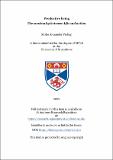Files in this item
Productive being : the continuity between life and action
Item metadata
| dc.contributor.advisor | Wheeler, Michael | |
| dc.contributor.author | Prokop, Mirko Alexander | |
| dc.coverage.spatial | 97 | en_US |
| dc.date.accessioned | 2023-03-03T09:33:27Z | |
| dc.date.available | 2023-03-03T09:33:27Z | |
| dc.date.issued | 2022-11-30 | |
| dc.identifier.uri | https://hdl.handle.net/10023/27090 | |
| dc.description.abstract | What is the relationship between life and agency? Are all agents necessarily living organisms? How are we to understand the phenomena of life and action? This thesis aims to answer these questions against the background of the autopoietic enactive approach in cognitive science. I develop a general conception of productive beings as systems capable of engaging in productive processes. A productive process is understood as a purposive, end-directed kind of self-movement whose cause or source lies in the subject which engages in the process. I argue that the capacity of productive systems to engage in productive processes is inextricably tied to their nature as materially precarious systems. In other words, the autonomous form of productive beings cannot be understood without reference to their materially fragile realisation. I then argue that, given an enactive conception of life and precariousness, productive systems must be understood as living systems. Since agents, on the developed view, are productive systems, I conclude that life is necessary for agency, from an enactive viewpoint. The understanding of this continuity between life and action is explored, throughout the thesis, from different perspectives. Apart from a careful examination of enactive concepts and proposals, the discussion engages Elizabeth Anscombe’s work on agency, Michael Thompson’s reflections on life-forms, Philippa Foot’s notion of natural goodness, Hans Jonas’ philosophy of biology, and Aristotle’s conception of the relationship between form and matter. | en_US |
| dc.description.sponsorship | "This work was supported by the German Academic Exchange Service (DAAD) [Scholarship ID: 57503736] and the University of St Andrews (Accommodation Award, 2020/1)."--Funding | en |
| dc.language.iso | en | en_US |
| dc.subject | Philosophy of mind | en_US |
| dc.subject | Enactivism | en_US |
| dc.subject | Agency | en_US |
| dc.subject | Autonomy | en_US |
| dc.subject | Philosophy of biology | en_US |
| dc.subject | Autopoiesis | en_US |
| dc.subject.lcc | BD418.3P8 | |
| dc.subject.lcsh | Philosophy of mind | en |
| dc.subject.lcsh | Agent (Philosophy) | en |
| dc.subject.lcsh | Autonomy (Philosophy) | en |
| dc.title | Productive being : the continuity between life and action | en_US |
| dc.type | Thesis | en_US |
| dc.contributor.sponsor | German Academic Exchange Service (DAAD) | en_US |
| dc.contributor.sponsor | University of St Andrews | en_US |
| dc.type.qualificationlevel | Masters | en_US |
| dc.type.qualificationname | MPhil Master of Philosophy | en_US |
| dc.publisher.institution | The University of St Andrews | en_US |
| dc.rights.embargodate | ||
| dc.rights.embargoreason | Embargo period has ended, thesis made available in accordance with University regulations | en |
| dc.identifier.doi | https://doi.org/10.17630/sta/321 | |
| dc.identifier.grantnumber | ||
| dc.identifier.grantnumber | ||
| dc.identifier.grantnumber | 57503736 |
This item appears in the following Collection(s)
Items in the St Andrews Research Repository are protected by copyright, with all rights reserved, unless otherwise indicated.

